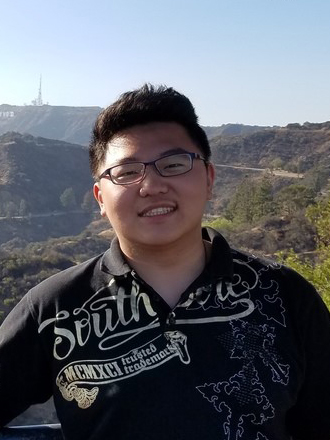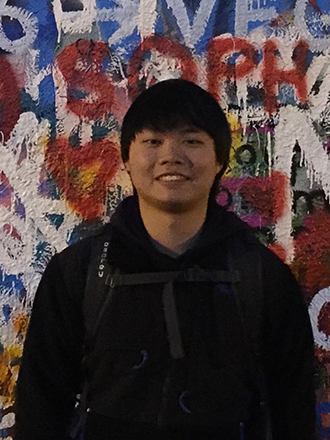 In keeping with the Allen School’s commitment to provide an unparalleled educational experience to students, many undergraduates participate in leading-edge research in our labs. Undergraduate researchers work alongside faculty, postdocs, and graduate students and often submit their work to major academic research conferences and scientific journals. This year, three of these talented student researchers — Kimberly Ruth, Preston Jiang, and Deric Pang — were recognized as part of the Computing Research Association’s 2018 Outstanding Undergraduate Researcher Awards, which highlight exceptional potential among young computer scientists.
In keeping with the Allen School’s commitment to provide an unparalleled educational experience to students, many undergraduates participate in leading-edge research in our labs. Undergraduate researchers work alongside faculty, postdocs, and graduate students and often submit their work to major academic research conferences and scientific journals. This year, three of these talented student researchers — Kimberly Ruth, Preston Jiang, and Deric Pang — were recognized as part of the Computing Research Association’s 2018 Outstanding Undergraduate Researcher Awards, which highlight exceptional potential among young computer scientists.
 Kimberly Ruth, a junior who is double-majoring in computer engineering and mathematics, was named a finalist in this year’s CRA awards competition. For the past two years, she has worked with professors Tadayoshi Kohno and Franziska Roesner in the Allen School’s Security and Privacy Research Lab as part of a team focused on security for emerging augmented reality platforms.
Kimberly Ruth, a junior who is double-majoring in computer engineering and mathematics, was named a finalist in this year’s CRA awards competition. For the past two years, she has worked with professors Tadayoshi Kohno and Franziska Roesner in the Allen School’s Security and Privacy Research Lab as part of a team focused on security for emerging augmented reality platforms.
Ruth collaborated with Ph.D. student Kiron Lebeck on the development of Arya, an AR system that protects against buggy or malicious output by applications. As part of that work, Ruth contributed to the prototype built on the Unity game engine, including a selection of applications in C# to run on the system. The team’s results were published last year at the 38th IEEE Symposium on Security & Privacy, with Ruth as the second author, and subsequently invited for publication in an upcoming issue of IEEE Security & Privacy Magazine. She also worked with Lebeck to design and execute a user study to evaluate people’s reactions and concerns related to AR technology, with an emphasis on multi-user scenarios, using the Microsoft HoloLens. Inspired by the results of that user study, Ruth has taken the lead on a new project examining a set of open questions related to the design of multi-user AR platforms that span computer privacy and security, operating system design, and human-computer interaction.
Outside of the lab, Ruth volunteers as a peer tutor for the Allen School’s Foundations of Computing course. She previously earned a 2017 Mary Gates Research Scholarship, a competitive award that recognizes University of Washington students engaged in undergraduate research, and a 2017-18 Washington Research Foundation Fellowship, which supports students engaged in sophisticated science and engineering research projects.
 Preston Jiang is a transfer student from Seattle Central College who works with Rajesh Rao, the Hwang Professor of Computer Science & Engineering and Electrical Engineering and director of both the Allen School’s Neural Systems Lab and the National Science Foundation’s Center for Sensorimotor Neural Engineering. He also works with professor Andrea Stocco, co-director of the Cognition & Cortical Dynamics Laboratory. Jiang was recognized with an Honorable Mention from CRA for his research on brain-computer interfaces (BCIs) and brain-to-brain interfaces (BBIs).
Preston Jiang is a transfer student from Seattle Central College who works with Rajesh Rao, the Hwang Professor of Computer Science & Engineering and Electrical Engineering and director of both the Allen School’s Neural Systems Lab and the National Science Foundation’s Center for Sensorimotor Neural Engineering. He also works with professor Andrea Stocco, co-director of the Cognition & Cortical Dynamics Laboratory. Jiang was recognized with an Honorable Mention from CRA for his research on brain-computer interfaces (BCIs) and brain-to-brain interfaces (BBIs).
Jiang started out applying his knowledge of signal processing, machine learning and systems integration to create a new BCI for controlling a cursor based on electroencephalography (EEG) signals from the scalp. Rao subsequently tapped him to serve as the lead student researcher on the third generation of their BBI project, which seeks to enable individuals to communicate directly using EEG and signals transmitted to the visual cortex via a transcranial magnetic stimulator (TMS). Jiang’s contributions focused on BrainNet, a system for linking three or more brains to collaboratively solve a task through visual brain signals. As part of this work, he helped to assess the viability and performance of the BrainNet, managed integration of the EEG, BCI, and TMS systems, and ran experiments with human subjects. Jiang also contributed to another ambitious project, this time exploring the potential for brain-based virtual reality, by cataloguing the variety of artificial visual sensations known as “phosphenes” that humans experience to enable the future development of VR systems based on direct brain stimulation.
The team plans to publish journal papers on both BrainNet and the brain-based VR project with Jiang as co-author. Jiang previously was recognized for research excellence with a 2017 WRF Innovation Undergraduate Fellowship in Neuroengineering and a 2017-18 Levinson Emerging Scholars Award, which supports juniors and seniors pursuing advanced research in bioscience and related areas.
 Deric Pang is a student enrolled in the Allen School’s combined bachelor’s/master’s program who earned an Honorable Mention in the CRA awards competition. He has contributed to research projects on fault localization, programming by natural language, and software testing under the guidance of professor Michael Ernst in the Programming Languages & Software Engineering (PLSE) group.
Deric Pang is a student enrolled in the Allen School’s combined bachelor’s/master’s program who earned an Honorable Mention in the CRA awards competition. He has contributed to research projects on fault localization, programming by natural language, and software testing under the guidance of professor Michael Ernst in the Programming Languages & Software Engineering (PLSE) group.
Pang was part of a team that changed our understanding of fault localization, an approach for identifying defective lines of code to save substantial effort in the debugging process. Previous research into fault localization techniques has tended to use artificial faults for ease of evaluation. However, Pang and his colleagues discovered that a technique’s performance on artificial faults is not a good predictor of how well it will handle real faults. After replicating previous work, the team found that only 30 percent of the evaluated techniques were statistically and practically significant for artificial faults — and none met this threshold for real faults. Pang and his fellow researchers used their findings to develop new, more effective techniques and presented their work at the 39th International Conference of Software Engineering (ICSE 2017). Pang also contributed to Tellina, a code translation tool that is the result of a collaboration between PLSE and a group of researchers led by professor Luke Zettlemoyer of the Allen School’s Natural Language Processing group. Tellina translates the natural language description of a desired operation into programming language using recurrent neural networks. The system enables programmers to be more productive by allowing them to describe an intended operation using their own words rather than having to memorize the details of increasingly complex systems. In a controlled user study, Pang and his colleagues found that, even in cases where Tellina’s predictions were not completely correct, programmers who used the tool significantly outperformed those who did not.
Pang previously completed internships at Marchex and Amazon, where he worked on automatic speech recognition and the Alexa Machine Learning team, and studied abroad as a computer science exchange student at ETH Zürich. He plans to spend this spring as an intern at NVIDIA working on autonomous drone research.
Since 2000, a total of 58 Allen School students have been honored by CRA for excellence in undergraduate research. Congratulations to Kimberly, Preston, and Deric — and thanks to the faculty and graduate students who serve as mentors and enthusiastically support undergraduate research!

